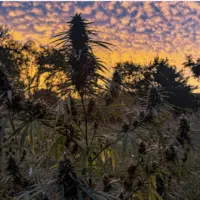
More than 40,000 Missouri food establishments and stores are estimated to be impacted by federal regulations on hemp products
BY: REBECCA RIVAS
Missouri Independent
John Grady and his wife Kara opened up their hemp emporium in Rosebud on July 4 — and they say about 60% of their customers are veterans, like Grady, who are treating chronic pain or PTSD with intoxicating hemp products.
Last night, they watched the U.S. Senate vote to approve a spending package to end a record-breaking federal government shutdown. But what drew their attention was a provision tucked in the bill that would prohibit hemp products from having more than .4 milligrams of total THC per container. If the House approves it and the president signs it, the prohibition will go into effect in one year.
The change, Grady said, will devastate his business.
“When this is done,” he said, “we’ll lose 52% of our revenue, meaning we won’t be able to stay in business.”
On Tuesday – a day they would normally be focused on honoring veterans – the couple said they didn’t have the energy.
“You’re sick to your stomach all day long,” said Kara Grady, “knowing your hard work is for not.”
State officials estimated last year that 40,000 food establishments and smoke shops and 1,800 food manufacturers were selling products that would be banned under the proposed federal regulations.
That estimate was part of the Missouri Department of Health and Senior Services’ 2025 budget estimate to enforce former Gov. Mike Parson’s abandoned 2024 order that would have banned intoxicating hemp products in the state.
Hemp was legalized in the 2018 Farm bill and naturally has very little THC, the intoxicating component mostly associated with marijuana.
But that potency can be increased with some science.
While marijuana products must be sold in dispensaries and be grown and manufactured in state-regulated facilities, intoxicating hemp products are completely unregulated by any governmental agency.
There’s no state or federal law saying teenagers or children can’t buy them or stores can’t sell them to minors. However, some stores and vendors in Missouri have taken it upon themselves to impose age restrictions of 21 and up.
Missouri state Rep. Dave Himan, a Republican from O’Fallon, said he was planning on pre-filing legislation on Dec. 1 that would have established a licensing system to allow Missouri businesses to sell the low-dose hemp-derived THC beverages and edibles.
If the federal spending bill passes, his bill will reflect the .4 milligram limit of THC per package – and that also includes THC-A, which transforms into THC when heated.
“We are really kind of looking now to see what the federal government’s going to do,” he said, “and if we need to make adjustments in my bill to mirror what the federal government’s going to put in place.”
This will be Hinman’s second year — and Missouri’s fourth year – trying to regulate intoxicating hemp products. Previous attempts failed because the proposed bills, backed by the marijuana industry, would have banned the products.
Last year, several bills failed to advance because the hemp industry itself couldn’t agree on provisions for things including THC limits and licensing requirements.
A report released last month by the Missouri Cannabis Trade Association, which represents the marijuana industry, tested 55 intoxicating hemp products purchased from smoke shops and gas stations statewide. Results showed that nearly all of them were above the total THC limit that’s outlined in the pending federal spending bill.
While the debate in previous years has often been seen as a marijuana industry versus the hemp industry, both of those players have a growing common foe – the black-market marijuana products that are posing as certified hemp products, Hinman said.
“There are some great people out there that own mom-and-pop shops that really are doing the right thing,” Hinman said.
However, just last week, Hinman met with a group that brought in packages of about 40 different THC products purchased throughout the state that resemble Skittles, M&M’s and chips that would easily be mistaken by children as regular products.
“That continues to proliferate throughout our state,” he said, “and it’s just getting worse and worse. So we’ve got to do something. And it’s actually not even hemp, it’s truly marijuana out there, and it’s really hurting the business.”
Eapen Thampy, a lobbyist who represents several hemp businesses, agreed that the “bad actors” have expanded and pose a threat to legitimate hemp businesses.
“We’re under attack from the marijuana industry that wants to protect their monopoly,” Thampy said, “and we’re under attack from bad actors who don’t care who they hurt to make a buck. We’re sort of the collateral damage in that picture.”
Thampy said the hemp industry is hopeful that Congress will take up the issue before the ban is implemented in a year, if the spending bill is approved. However, a Senate amendment to remove the language was defeated last night by a 76-24 vote, making the success of a separate bill unlikely.
President Donald Trump told reporters Monday that he supports the deal and the House could vote on the bill as early as Wednesday.


